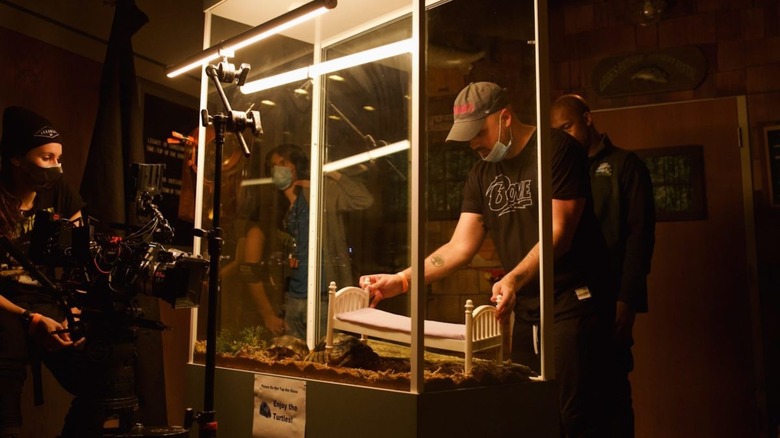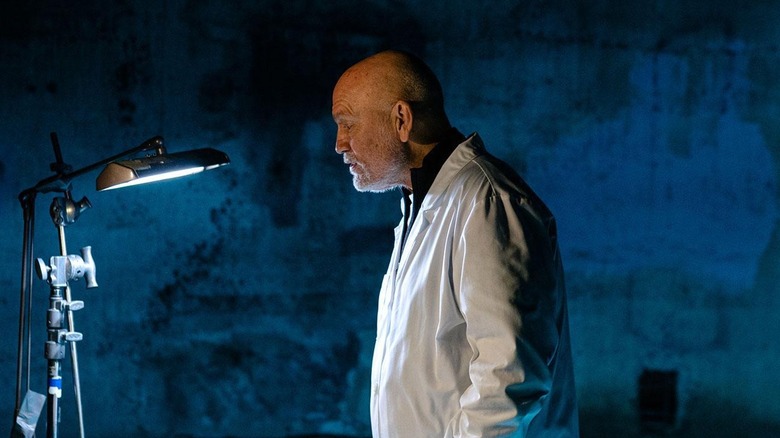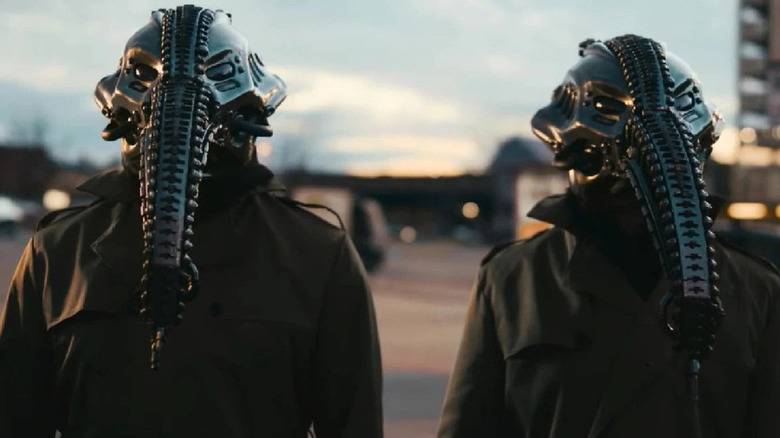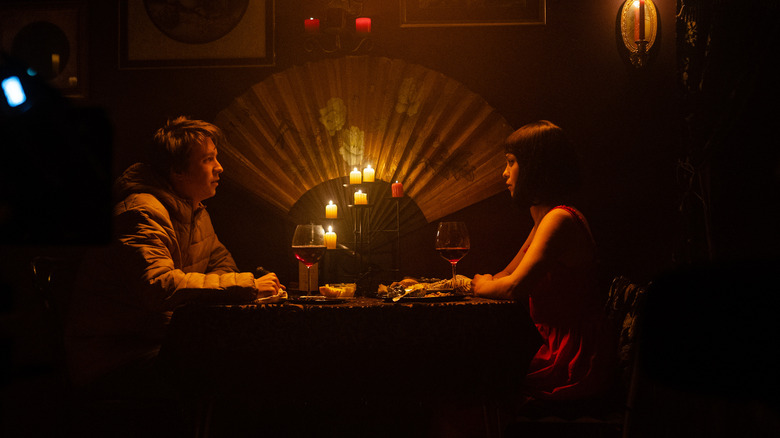Chariot Director Adam Sigal Went From Being A Private Investigator To Filmmaker [Interview]
Adam Sigal had a unique path towards filmmaking. Prior to getting behind the camera, he was a private investigator. He's not the first to transition from that overly romanticized job to storytelling. As Sigal told us, there's some crossover between the two gigs, both requiring observational eyes. One day, he decided to write a script, called "Daydreamer." It was his first script, it got made, and it starred Aaron Paul. 15 years later, Sigal is no longer a PI and has a few movies under his belt as a director, including the newly released "Chariot."
It's a surrealist romantic comedy about life, death, reincarnation, and paranoia. The story is simultaneously a lot and a little to take in, both easy and tough to explain. "I am not super into classifying my stuff," he told us. "It's kind of like it's whatever you think it is, whatever you get from it is fine." With "Chariot," Sigal directed his original screenplay and hired the likes of Thomas Mann, John Malkovich, and Rosa Salazar bringing it to life.
Recently, the writer-director told us about his journey from private investigating to storytelling and shared advice for aspiring filmmakers.
"You see people doing horrible things to each other on a daily basis"
Being a PI requires a certain level of perception, so did you find any similarities between that profession and being a director?
No question. As a PI who does surveillance, which is what I did in L.A., you just see so many different sides of people. You see people doing horrible things to each other on a daily basis and then hiding it and lying about it. For my experience, I moved to L.A. when I was 19. So when I was a kid, I didn't know what the heck was going on. I was kind of thrust into spying on people and I got such a great sort of understanding of people and how they interact. I spent a lot of time in parts of the city that I wouldn't go to. It very much informed the characters in my stories a lot, just as far as how they act. So, definitely.
Well, this is a story of people hiding, too.
Exactly. Yeah, 100%, and I saw a lot of that. I mostly did it for workers' comp fraud. So I'd have a guy who came in with a neck brace and was like, "I hurt myself, I can't walk." Then I'd follow him to play soccer an hour later and I'm like, "OK, that was pretty good acting."
When you were doing that job, were you writing on the side?
No, I came to L.A. wanting to be a novelist. I started dating this actress and she would bring her scripts and her sides home to me and start rehearsing. I was like, "This writing is terrible. I've never written a script and I could write better than this in my sleep. I could literally just write on this script and make it better." So I wrote a script in, I guess this would've been like 2005, 2006. Got it to a friend who was an investor and we made it. I had no idea what we were doing, I had a friend direct it. Aaron Paul was our lead, long before "Breaking Bad." It caught on from there and I realized that I was good at it. I said, "OK, I'm going to stick with this."
That's quite an accomplishment to have your first script produced.
I think I approached the whole industry just from such a novice viewpoint. I didn't know how hard it was to get a movie made, I just did it. Then later it would be like, "My God, you got a movie made!" Now, I've seen how hard it can be to get movies made. Yeah, I think it was the naivety that helped me at that early juncture.
So were you working as a PI before that was produced, or after?
Yeah, I was working as a PI before, during, and after. I only retired from that job about five years ago.
Don't miss it whatsoever?
I don't. No, it was just a lot of sitting in my car outside people's houses. Telling stories and making movies is what I was born to do. So it's definitely my life's purpose. It always has been, even when I was a PI.
So, do you approach getting movies made similarly now, just doing it? Or do you deal more with the business side?
It's actually a piece of advice I give to filmmakers who are starting: You know more than you think you do. What I mean by that is there's a million different ways to get a movie green-lighted. There's the established ways that people who in some capacity make movies will tell you it is the only way, but it's not. The things that make sense to you on a very basic level about getting a film made remain true, if that makes sense.
For me, the other side as well, things that don't make sense to you don't make sense and are probably BS. You can get so inundated and buried with all the nonsense about the ways that things have to be done and to get a film made. How long it has to take and how hard it has to be and what steps you have to take and what you need, and it's not true. It can be, but it's the Wild West to a large extent. I advise people to go with what feels right to them and just make your own way, to an extent.
"Look, if your script is amazing, it's going to get made"
As you said, it's the Wild West, so what are some ways you'd recommend people just making their movies?
I've just gone the route of asking rich people for money to make a movie, and that's actually not the most common route. It's like getting an actor and doing structured financing and all that. I've done that, too — I'm doing that on my current film. But there's crowdsourcing, there's so many different ways that you can do it. But essentially, it just comes down to somebody believing in your work.
Whatever it takes to get them to believe in your work is what you got to do. There's just so many falsehoods I think that people who fail or have failed a bunch tell themselves. "I didn't have the right person attached, even though my script is amazing." Look, if your script is amazing, it's going to get made. If you're that talented, trust me, it'll find its way.
Was "Chariot" as simple as asking a rich person for their money?
It was. One of the most difficult things in the world is attaching big names to small movies. It's incredibly hard to do. You have to get through the agent barrier, you have to deal with the fact that they're getting paid less. They don't know who you are, they don't know if you're an idiot. They don't know if they're going to be staying in a Motel 6. They just don't know anything, so it's so hard. But with this one, Malkovich read the script and just said, "I love this script, I'm making this movie." I was like, "OK, well, we should talk to your agent." He's like, "Yeah, I'm coming, so book my travel. This is one of my favorite scripts I've read in 20 years, I didn't have to change a single line. It's polished, it's ready, it's my vibe, let's do it." It is that simple sometimes. If your work is great, it'll find people.
How do you write roles, not only stories, that you think will attract big names to small movies?
I think the only thing that sets me apart writing-wise is I make it my life's purpose to do things that are different. I know a lot of writers who look at what's out there and look at what's popular and look at what trends there are in Hollywood and then they follow those. They're very smart and they make more money than me in a lot of cases and get their films green-lit more easily.
Me, I just don't care. It's so not interesting to me to follow what types of projects are currently being green-lit. I just don't care. I think it's refreshing because I think actors get a lot of the same stuff over and over and over again. Whether my work is like this incredibly high quality, which it is or it isn't, it's different. I think that they respond to that, some actors do. Those actors like John Malkovich, who's always done whatever the hell he wants, in any case. I think that they gravitate toward this type of material.
Rosa was the same. Rosa is extremely avant-garde. She's very independent-minded, hates to do the same stuff that's already out there and everyone is doing. She was the first actor on this one who was like, "Yeah, this is my type of thing."
Creatively, how'd you two connect?
Rosa's a real actor, so she just very much makes choices and sticks to them. She cares about the material, about her performance, and it shows. She makes a choice about who the character is and sticks to it and plays that. She's not a method actress, but she is very decisive, which is what I love about an actor. I'm a director and I can give them guidance about the character, but I want them to make strong choices of their own. I'm not an actor and I have no idea how to act.
The worst thing for me is I can convey like, "OK, this is who this character is. This is what I was writing in this scene, this is what I intended." Then they're kind of like, "OK. Yeah, I don't really know how to portray that." I'm like, "God, I don't either, I'm not an actor." With someone Rosa, she's like, "I think she would do this, this, and this and this." No matter how outlandish it may be, I'm like, "Cool, that's great. You're the actor, so I trust you implicitly to distill what I'm trying to portray." She's fantastic at that. She's like a female John Malkovich.
"Please, for the love of everything, just do something different"
How'd you end up obsessed with death and reincarnation?
Man, as soon as I was able to form a coherent thought I wondered about those types of things, probably way too young. I've always been a massive science fiction and fantasy fan. You know what's an odd reference actually, where the whole "what happens after you die" came from for me? One of the first books I read and loved was a sequel to "A Princess of Mars," I think, "The Gods of Mars."
It's been forever since I read it, but there's this primitive civilization and when someone dies, they send them on this river. Where they end up going is to this more advanced civilization and they just like resuscitate them and make them slaves. Put them in some slave factory or something. Then you find out that they have this sort of mythos and that it involves an even higher civilization.
I read that as a kid and was so fascinated with this idea that we mystify death as humanity because we just don't know what happens. But that doesn't necessarily mean it's mystical. It just means we haven't figured it out yet. So that concept was fascinating to me. I think that was probably the first time I started to really think about it.
We all have our own thoughts on death and reincarnation, so how'd you find people responding to those ideas in your script for "Chariot?"
It's a universal subject and I was worried initially because it's so odd. Everyone thinks about it. Everyone who thinks about anything thinks about it. They think about death, they think about reincarnation. It was a more universal subject than I thought it would be. I thought people would just be like, "This is strange," but they're like, "No, that's cool."
Lo-fi approach to a high-concept story, right?
Absolutely. That's 100% very much my favorite sub-genre.
Do you place certain limitations on yourself, though, when writing an indie about those ideas?
Yeah. It's an independent film, so I have to be realistic while I'm writing it. I think that's one of the biggest pitfalls this falls into: Being too ambitious. If you can cleverly do it in a way that doesn't affect your vision, it's the thing to do.
You shared some sound advice for filmmakers earlier. Any other pieces of earned wisdom you'd like to share?
I have a number of pieces of advice I give. The first is just from a personal perspective, please just make it different. Don't do like a knockoff version of something that's already out there, inspired by whatever. Please, for the love of everything, just do something different. It'll be recognized, people will dig it. Then the second thing is, like I said, take advice, but also stick to your own truth and your own knowingness.
Another piece of advice I give is don't underestimate human connection. Don't underestimate you're going to be kind of afraid talking to this big agent or this big producer. But they go home and they're with their kids and their dog, they're the same, they're people. Make personal connections and they will lead to more opportunities.
Being likable goes a long way, too.
Absolutely. Yeah, no question, for sure. Tons of business gets done that way. They like you, they'll work with you. That's the truth if you're likable. If you're a jerk, if you're super, super, super talented, maybe you'll still do OK. But there are plenty of people who are maybe not quite as talented as you, but are cool and they want to hang out with and be on set with and make a movie with. They'll get there before you.
"Chariot" is now in theaters and available on Digital and On Demand.



